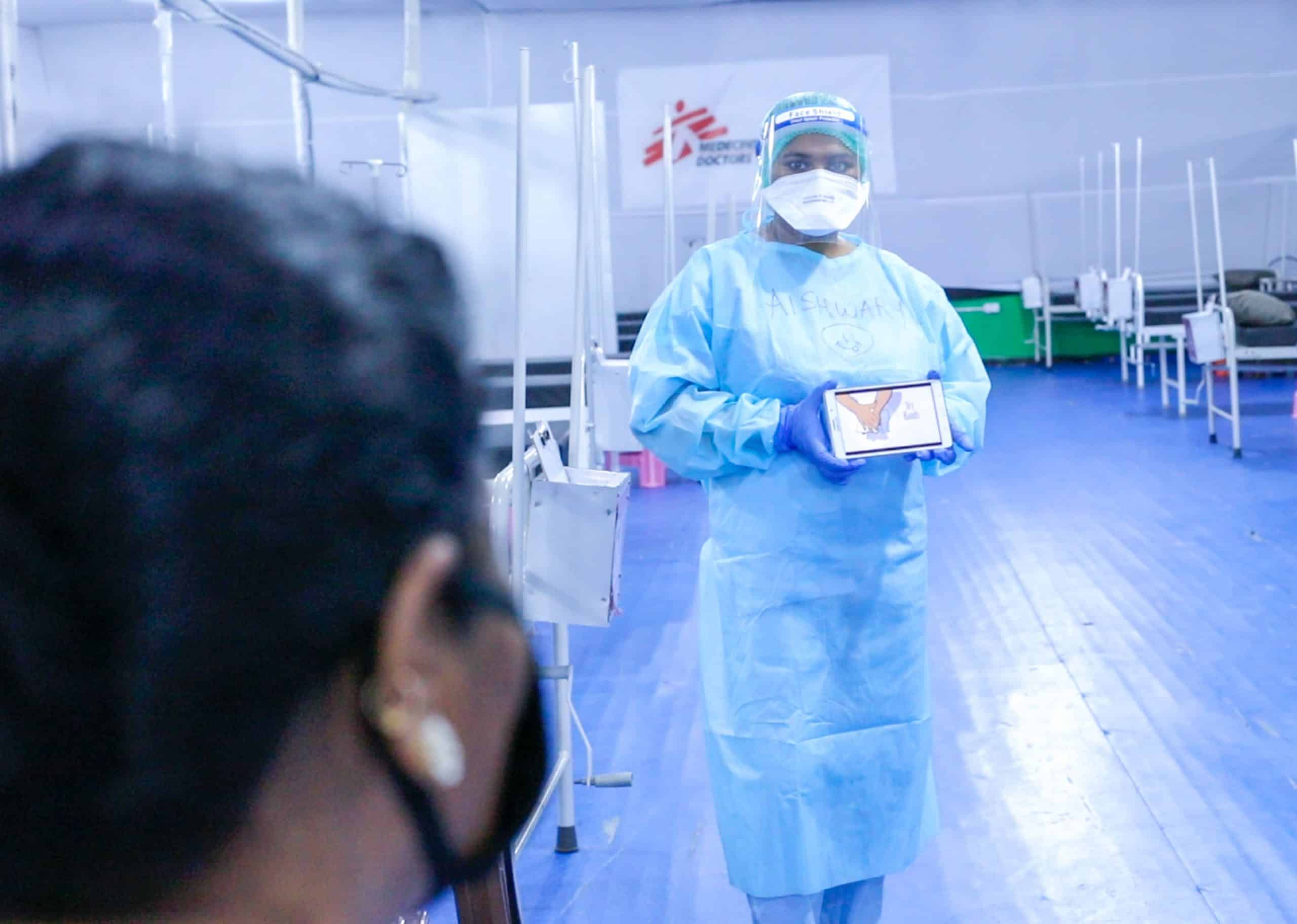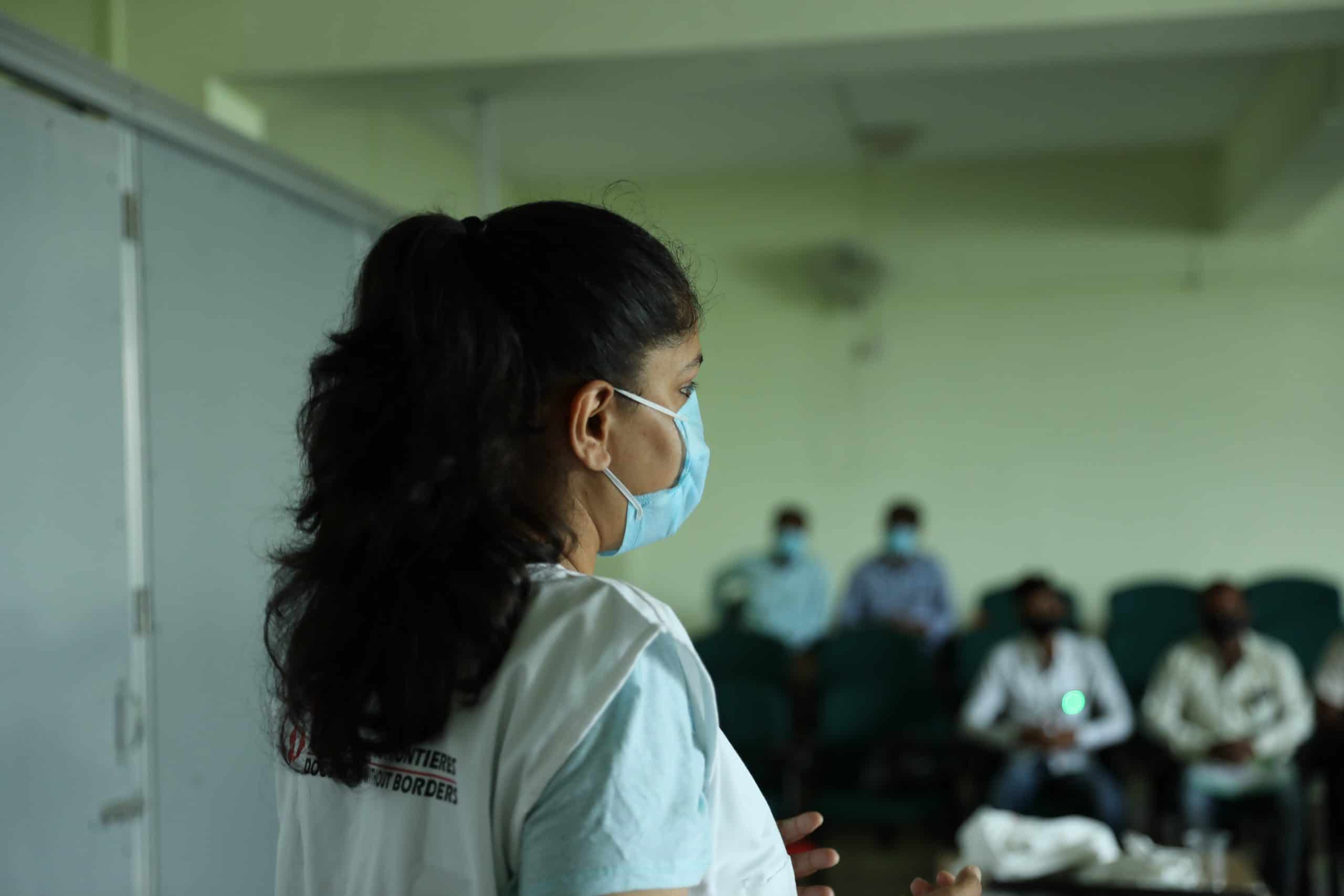Challenges, fears and stigma of working on the frontline of COVID-19 in India.
A blog by Smriti Singh*
The COVID-19 pandemic has posed a unique challenge before frontline workers — it is to strike a balance between helping patients cope with inaccurate beliefs about the disease and managing their own fears.
Three months ago, when I reached the city of Patna, Bihar — the place where our team was going to set up a COVID–19 temporary hospital and which would also become my home for the next two months, I realized that the pandemic is more complex than we can imagine and how few resources have been placed to deal with psychological factors that influence pandemic related behavioral problems.
Bihar, the first state where MSF set up its COVID-19 project in India, is also the third most populous state in India with only 11 percent of its population living in urban areas. Since March, around 3.2 million people have returned from all over the country to their hometowns in Bihar amid the pandemic.

Fragile healthcare infrastructure
With only 0.11 beds and 0.39 doctors available per 1,000 people, the state has a fragile healthcare infrastructure, which can easily get overwhelmed with the increasing burden of cases. Bihar has also the lowest testing rate in the country[1].
In such a densely populated area, access to hasty communication through a dizzying area of media has potential to escalate the risk of panic among the people. Information dissemination and awareness generation becomes a critical aspect of tackling the pandemic considering how lack of knowledge often leads to rumours and misinformation.
Even among the frontline workers, to know, understand and adapt proper infection prevention and control measures is something that comes with constant dialogue.
One of the biggest challenges for us was to trigger a behavior change among people — patients and staff alike, which was not limited to just the aspects of physical distancing, hand hygiene and wearing masks but to actively dispel any misconceptions, fears around COVID-19 and deal with our own mental health concerns.
Smriti Singh
Deputy Field Coordinator (May-June 2020), MSF COVID-19 Treatment Centre, Bihar
“For me, working in COVID-19 response meant that I had to put on a brave face at all times and not let my fears and concerns affect my work. At the same time, to lower the risk of infection, we chose to socially isolate ourselves.”

Fear and stigma associated with COVID–19
Patna’s Patliputra sports complex, where we set up the hospital, is adjacent to an empty plot of land where local neighbourhood kids come to play cricket. One day, a ball dropped from the other side into our premises. Suddenly, we started hearing kids shouting “corona, corona, give our ball back!”. Yes, we were called “corona”, a colloquial term for COVID-19.
What I initially found amusing was actually reflective of how stigma is perpetuated against frontline workers and people infected with COVID-19. With more nearly 2.4 million reported infections [2], India has the world’s third-largest caseload of COVID-19. As the virus spreads, so did fear and stigma, inflicting the rich and the poor, and pervading cities and villages.
When I decided to work in this project, my biggest worry was how my neighbours would react once I come back from the project. There were enough stories in the media about neighbours harassing the families of people working on the frontlines. I decided to put this worry behind me to deal with it later. But, it was not different in Patna.
Within a week of us arriving, people living around the sports complex started protesting on social media against setting up of COVID-19 treatment facility in their locality fearing that it would lead to them being infected. Many of our local staff were also asked to vacate their homes overnight once their landlords found out that they were working as frontline workers in the COVID-19 response.
The fear and stigma around the pandemic also meant that getting human resources was going to be a major hurdle for us. New recruits dropped out from the project at the last minute out of fear of the pandemic. We have treated patients who were thrown out of their homes or assaulted by their neighbours after being tested positive. Stigma forces people to hide illness, avoid tests and delay hospitalisation, which often leads to serious consequences.
Mental health, a neglected concern
“You have the courage that I lack”.
“You are so strong”.
“We are so proud of you for doing this”.
These are some of the messages I received from friends when I left to work in the project. To an outsider, people working on the frontlines in COVID-19 response look strong and resilient in the face of the unknown. What gets unnoticed is that their calm surface appearance is the only armor they have left.
For me, working in COVID-19 response meant that I had to put on a brave face at all times and not let my fears and concerns affect my work. At the same time, to lower the risk of infection, we chose to socially isolate ourselves. This meant choosing to stay away from our families for a long period and minimizing social interaction among colleagues.
This significant disruption in social support — in the name of helping and protecting others — could make it a very lonely process and can deeply affect one’s mental well-being. Fear and paranoia sets in and is further magnified if someone around you is tested positive.
The situation is worse for healthcare workers. They have to deal with the traumas they see and live with the decisions they are forced to make at their jobs. People working on the frontlines are barely keeping it together. I was anxious and afraid. So were my colleagues. We all had trouble sleeping and tempers flew at the drop of the hat. The overall feeling among people that frontline workers are courageous is in fact, an impending doom for them.

Much more than a health crisis
The COVID-19 pandemic is much more than a health crisis. It has the potential to create devastating social, psychological, economic and political effects that will leave deep and longstanding scars.
At our COVID-19 treatment centre, every day MSF lay-counsellors spend hours talking to the patients, listening to their concerns and understanding of the disease. They have to actively observe the behaviors and practices of the patients and correct them, when needed.
COVID–19 pandemic has pushed people into panic and chaos and unless they are equipped with the right information, it would be difficult to break the chain.
As the response evolves, and after assessing the immediate, medium and long-term impact, it is pertinent that the healthcare systems start investing heavily in psychosocial support, awareness, fighting misinformation as part of their strategy to cushion the potentially devastating impact the virus may have on vulnerable people and frontline workers.
*Smriti Singh worked as the Deputy Project Coordinator at MSF’s Patna COVID-19 intervention between May and June 2020
[1] In Bihar, 7,917 tests are done per million as against 18,086 national average.
[2] 2.39 million infections and 47,138 deaths, as of 13 August 2020.
-
Related:
- Bihar
- coronavirus
- COVID-19
- mental health












